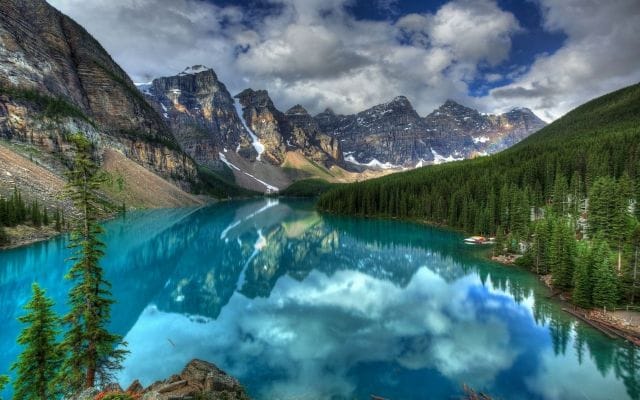Episodes: Wherever you go, there you are

Earlier in the week, I attended the Banff World Media Festival to moderate a panel for The Leftovers. It was a great honor, both to get to discuss a show I love and to attend a hugely prestigious industry event (even if I was only there for a few hours, really). But it was also fun to travel way out into the middle of nowhere, to a place that's one of the most devastatingly beautiful on Earth, but a place lots of Americans don't know about, because you have to be really intent on getting there.
To get to Banff, you first have to fly into Calgary, which is not easy from much of the US (though it has direct flights to a few cities). Then, you have to hire or rent a car or take a bus 90 minutes away, off into what appears to be the absolute wilderness, with only a few specks of civilization here and there, before you finally make it into the Banff National Park, where the town itself (which is mostly hotels) is located.
When I finally got there, one of the staffers helpfully told me that if I planned on going for any midnight walks, I probably shouldn't, because there was a wolfpack about that wasn't afraid of humans. And also bears. Sure. Fine.
But that's not the reason for this story. The reason for this story is that the second I disembarked in Banff, which I had traveled thousands of miles to get to, the very first person I saw when I stood up from the car was a TV writer I've interviewed many times, who knew me well enough to be somewhat startled to see me, there in the cold of the Canadian Rockies. We said hello, and then didn't see each other again.
This is the kind of odd connection that seems to suggest the world is smaller than it is, like when one of my best friends' best friends was married to the creator of one of my favorite TV shows, totally accidentally (since my best friend is from the other side of the country entirely), or when I add someone on Facebook and check our mutual friends and discover we both know some completely random person from my past. The webs we weave are larger and stranger than they could possibly seem.
Or are they?
I've been thinking a lot lately about how little I know of true poverty. Sure, my wife and I have been flat broke at various times in our lives, have had to scrimp and save to have enough money to eat. But the true threat of completely losing everything was never really there. We always knew that if push came to shove, our parents would be there to bail us out. And neither of us has terribly rich parents. We're not trust fund kids; we just come from families who can afford to keep themselves comfortable.
But I recently got into an argument with someone from my hometown, who essentially said that I was a spoiled rich kid, who never had to work a day in his life and had everything handed to him. And it doesn't seem that way to me, to someone who has actually met some spoiled rich kids. (I would invite my friend to time travel with me back to when I was doing seemingly endless amounts of chores on my parents' pig farm.)
But to my friend, I can see where it did seem that way. My parents had enough money to send me to college (albeit to a cheaper state school), and they had enough money to keep me afloat post-college, when I needed a few bucks here and there. It doesn't feel rich to me, but in the grand scheme of things, in these United States, it's pretty darn rich.
My only real experiences with poverty have come from seeing homeless citizens of Los Angeles, but also from having spent time in college traveling to the reservations in my home state, which are among the poorest counties of the U.S. And that was often a world that defied description to me, even as someone who works with words. It seemed like I'd been dropped out of every context I understood, into one that made no sense whatsoever. Similarly, I have friends who work as social workers, and the stories they tell me seem as if they can't be real, and yet they are.
The hardest gap to overcome is often the one between those who have and those who don't. You can superficially imagine what it's like to temporarily go without, but for the most part, if you are reading these words (i.e., if you are the kind of person who subscribes to a television critic's TinyLetter on the internet), the odds are very good that you will find yourself buoyed by someone who has a vested interest in seeing you succeed. You can have tough times. You can even have long years of grinding work and living paycheck to paycheck. (I certainly did; I'm barely removed from them.) But you cannot know what it is to be utterly without.
Now, when I come across one of these "isn't the world small!" coincidences, I often wonder if the world is truly small, or if it's just my circle, of the relatively affluent and comfortable, that's small. I wish it were the former; I'm guessing it's the latter.
--
Episodes is published at least three times per week, and more if I feel like it. It is mostly about television, except when it's not. Suggest topics for future installments via email or on Twitter. Read more of my work at Vox Dot Com.




